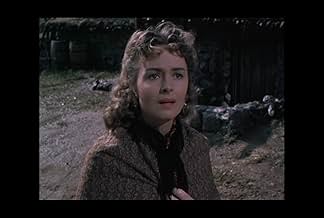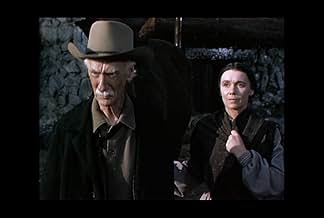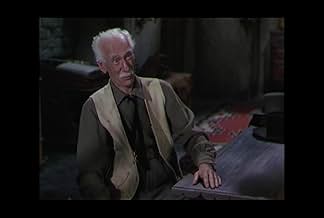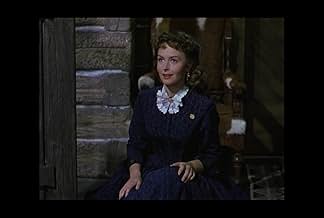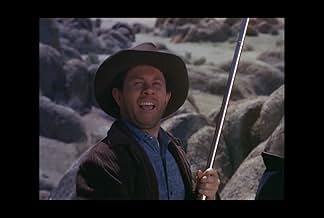Adicionar um enredo no seu idiomaA Confederate Major and his troops are falsely led to believe the Civil War is not over, and become wanted men after they attack a Union Army wagon train in Nevada.A Confederate Major and his troops are falsely led to believe the Civil War is not over, and become wanted men after they attack a Union Army wagon train in Nevada.A Confederate Major and his troops are falsely led to believe the Civil War is not over, and become wanted men after they attack a Union Army wagon train in Nevada.
- Union Captain
- (não creditado)
- Drifter
- (não creditado)
- Hank Fletcher
- (não creditado)
- Stage Driver
- (não creditado)
- Drifter
- (não creditado)
Avaliações em destaque
Incredible to think that this fine Western was the only effort to have been directed by Roy Huggins; because it's exactly that, damn fine. He would go on to direct notable work in TV such as The Virginian, The Rockford Files, Maverick and The Fugitive, but it seems that he wanted to put down a marker that he could in fact direct a feature length film, and although it only runs at a respectable 80 minutes, he must have been real satisfied with the finished product. Huggins is backed up by genre legend Randolph Scott in the lead role of Major Matt Stewart, with Scott providing the sort of performance that reminds us of his excellent work for Budd Boetticher in Ride Lonesome, The Tall T and Comanche Station etc. Donna Reed (lovely as ever), Lee Marvin (another fine loose cannon job), Richard Denning and Frank Faylen all beef up the cast, and although some of the other supporting players do not quite shine so bright, they do, however, earn their corn and don't harm the movie.
The film itself is structured real well, we open with a fantastic sequence as the "Rebs" attack the Union troop, with Charles Lawton Jr's photography expertly capturing the Lone Pine vista in Technicolor glory. From here we are centred inside the way station in what at first appears to be your standard Rio Bravo set up, this set up could easily have failed if the characters inside the building were dull and very uninteresting. Thankfully Huggins, who wrote the story as well as directing it, gives us characters of interest with little offshoots of conflicts to further enhance the plot. This makes for a tense build up until we lurch towards the inevitable showdown where the rouges gallery of thugs outside - who want the gold at any cost to life - plot with hungry menace.
It's not perfect by any stretch of the imagination, as some B movie traits and budgetary tone downs are evident, but the quality is still impressively high. From the direction and photography to the performances of the leads; Hangman's Knot is an essential viewing for the discerning Western fan. 8/10
As Scott grew older in his acting career, he made predominately Westerns. At the same time his face grew harder, more sinewy and austere. Something of his matinee idol looks and southern accent remained, but age brought something else - a moral gravitas than added immeasurably to his on-screen presence. Finally the 'Scott character' achieved a magisterial quality - a characteristic that added immeasurably to the ironic resonance of his last film Ride The High Country.
In Hangman's Knot, Scott plays a Confederate officer who only learns that the Civil War is over after a successful action in which his group take a gold shipment from Union soldiers. He and his men agree to return home, each with their share of the booty, but run across some outlaws who corner them in a way station, laying siege to them.
This is a situation familiar to those who know those later Scott-Boetticher masterpieces, and the familiar hallmarks are already in evidence. Even the same locations are utilised. Like the later films with a different director, this is a morality play, almost a chamber drama, where Scott makes a dignified stand of principle. In Hangman's Knot, those with the dark hearts are both outside the way station's walls waiting to pounce, as well as inside (a characteristic performance by Lee Marvin, reminiscent of that he gives in The Big Heat). These are the men that Scott's character, Stewart, cannot relate to: those without honour or moral courage, greedy, cruel men. For Scott, as he says in one of those later films, 'there are some things a man can't ride around' and these are the choices that have to be made. A man needs to face up to his options in life and live with himself on or off the trail. When he tells Marvin here that he 'never really knew (him) at all', we know the moral battlelines have been drawn, just as distinctly those that existed between the warring states.
At first the gold is merely the spoils of war. Then it becomes a short cut to happiness, an unexpected reward for the men's trouble, and a compensation for the loss of the War. Finally it is just a moral encumbrance, both to body and mind. By the end of the film, as Scott and the boy let the heavy saddle bags slip off their shoulders, the sense of relief is tangible - one which isn't just physical.
A film well worth investigating, full of artistic resonance and anticipations. And if you haven't seen the later Scott-Boetticher vehicles, some of the greatest B-Westerns ever made, see this as a taster.
The jarring note was the obligatory romance for Westerns of this period, this time between 54-year-old Scott (in the beginning of the film at least almost looking his age) and 32-year-old Donna Reed (as delightful as ever).
They don't come much more taut than this, and its success only brings into question as to why director Roy Huggins never made another film as director. This one really begins to approach the later Boetticher films, being set in an isolated way station, as several of Budd's films happened to be, with Randy as a Confederate officer, who has stolen Union gold, not knowing the war is over.
Outlaws, learning of the loot, besiege the soldiers at the way station, but just as much danger comes from within - the menacing soldier played by Lee Marvin. The cast is better than those in the then most recent Scott vehicles, including Donna Reed, Claude Jarman, Jr., Richard Denning and Guinn "Big Boy Williams. Randy's son C.H. Scott, in the book "Whatever Happened to Randolph Scott" speaks fondly of Donna Reed, as if she was a second mother, and says that she and his father never lost touch over the years, and were devoted to each other.
Omitting the Boetticher films, this one is clearly the strongest Scott offering of the 1950s. That Huggins never directed a feature film again (he did direct a 1970 TV movie) is more our loss than his. Huggins did quite well in the long run, with items like Maverick, Rockford Files and The Fugitive in his future.
With much of the film set within the way station, Huggins manages to keep the tension high as Scott has to deal with the group of bounty hunters outside (led by Ray Teal in a rousing performance) and the wayward loose cannon Ralph, the Lee Marvin character. Lee must have impressed producer Scott as he got a much showier role in the first Scott-Boetticher classic SEVEN MEN FROM NOW. Meanwhile, Scott must serve as surrogate big brother of Claude Jarman Jr, no longer the little boy of THE YEARLING and in fact nearly as tall as the film's lead star.
Richard Denning also impresses in his part as Donna Reed's fiancée, a character as weak-willed as the fiancée in the later Boetticher film THE TALL T. At first willing to call attention to an attempted escape by Scott and company (despite giving his word otherwise), he later bargains to give them an alternate plan of escape - in exchange for two bars of the captured gold.
My favorite of Scott's 50's westerns prior to his Boetticher films and dollar for dollar, the equal of many much bigger budgeted items from the likes of Wayne and Cooper.
Você sabia?
- CuriosidadesAfter the scene of Lee Marvin holding Donna Reed against the wall, she was so terrified by him that she did not let him come near her on and off the set.
- Erros de gravaçãoWhen the Confederates ambush the Union gold shipment, they use dynamite. The film is set in 1865, but dynamite was not patented by its inventor, Alfred Nobel, until 1867. Dynamite was not in use during the American Civil War by either side.
- Citações
Lee Kemper: You got 'em confused.
[Lee laughs]
Lee Kemper: They'll a-find out though and get their hands on it, there ain't gonna be nobody left alive in here to tell. You got any plans?
Major Matt Stewart: Mm-hmm. We go out shooting.
- ConexõesReferenced in Hollywood Remembers Lee Marvin (2000)
Principais escolhas
- How long is Hangman's Knot?Fornecido pela Alexa
Detalhes
- Data de lançamento
- País de origem
- Idioma
- Também conhecido como
- Hangman's Knot
- Locações de filme
- Empresas de produção
- Consulte mais créditos da empresa na IMDbPro
Bilheteria
- Faturamento bruto nos EUA e Canadá
- US$ 1.250.000
- Tempo de duração1 hora 21 minutos
- Cor
- Proporção
- 1.37 : 1
Contribua para esta página



